This article needs additional citations for verification .(August 2020) |

The Roxheim Synagogue was a synagogue built in 1889 in Roxheim, Germany. The unrestored building was located on Bobenheimer Strasse and was demolished in the 2010s.
This article needs additional citations for verification .(August 2020) |

The Roxheim Synagogue was a synagogue built in 1889 in Roxheim, Germany. The unrestored building was located on Bobenheimer Strasse and was demolished in the 2010s.
The Jewish community in Roxheim had previously used a smaller synagogue, which was destroyed in a heavy flood of the river Rhine in 1882. In 1889, a new building was consecrated in the same location. It was taller than the predecessor. There was a teacher's apartment on the ground floor and the prayer room upstairs. The documents report a painting "with rosettes, friezes and decorative lines". Parts of the Torah shrine were gilded. [1]
After the First World War, the Roxheim Jewish community had insufficient adult men to maintain a minyan. The community dissolved around 1930. The synagogue was sold and converted into a residential building. Because of the change of ownership, it was not damaged during the Nazi era.
The building, on Bobenheimer Strasse, was within sight of the Catholic parish church of St. Maria Magdalena from 1834. The building was not listed as a monument. The preservation status of the building ended in 1985. [2] It was the last example of a synagogue in the northern Rhein-Pfalz-Kreis and in the eastern part of the former district of Frankenthal.

Rhineland-Palatinate is a western state of Germany. It covers 19,846 km2 (7,663 sq mi) and has about 4.05 million residents. It is the ninth largest and sixth most populous of the sixteen states. Mainz is the capital and largest city. Other cities are Ludwigshafen am Rhein, Koblenz, Trier, Kaiserslautern, Worms, and Neuwied. It is bordered by North Rhine-Westphalia, Saarland, Baden-Württemberg and Hesse and by France, Luxembourg and Belgium.
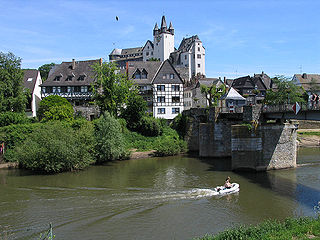
Diez an der Lahn is a town in Germany's Rhein-Lahn district in Rhineland-Palatinate, on the borders of Hesse. Diez is the administrative seat of the municipality of Diez.

Emmelshausen is a town in the Rhein-Hunsrück-Kreis (district) in Rhineland-Palatinate, Germany. It is the seat of the Verbandsgemeinde Hunsrück-Mittelrhein, to which it also belongs. Emmelshausen is a state-recognized climatic spa (Luftkurort), and in state planning is set out as a lower centre.

Bobenheim-Roxheim is a municipality in the Rhein-Pfalz-Kreis, in Rhineland-Palatinate, Germany. It is situated approximately 5 km south of Worms, and 13 km northwest of Ludwigshafen. It is mentioned in the Wormser wall-building ordinance from around 900 as one of the places that shared responsibility for maintaining the city wall of Worms.

Mutterstadt is a municipality in the Rhein-Pfalz-Kreis, in Rhineland-Palatinate, Germany. Though classified as rural the municipality does contain urbanized areas.

Beindersheim is a municipality in the Rhein-Pfalz-Kreis, in Rhineland-Palatinate, Germany.
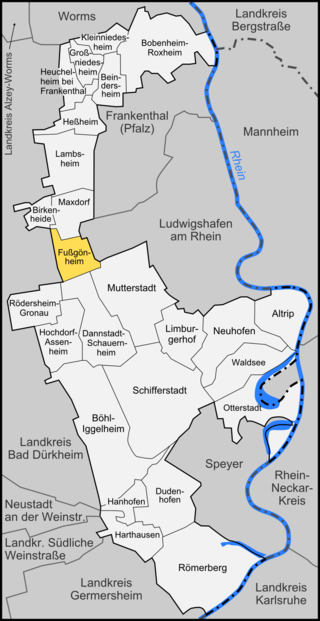
Fußgönheim is a municipality in the Rhein-Pfalz-Kreis, in Rhineland-Palatinate, Germany. It is a member of the Verbandsgemeinde Maxdorf, together with Maxdorf and Birkenheide.
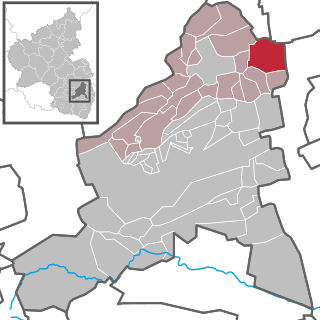
Dirmstein is an Ortsgemeinde – a municipality belonging to a Verbandsgemeinde, a kind of collective municipality – in the Bad Dürkheim district in Rhineland-Palatinate, Germany. With its roughly 3,000 inhabitants, it is the third largest Ortsgemeinde in the Verbandsgemeinde of Leiningerland, whose seat is in Grünstadt, although that town is itself not in the Verbandsgemeinde. Dirmstein lies in the outermost northeast of the district and the northwest of the Rhine-Neckar urban agglomeration.

Ebertsheim is an Ortsgemeinde – a municipality belonging to a Verbandsgemeinde, a kind of collective municipality – in the Bad Dürkheim district in Rhineland-Palatinate, Germany.

Guldental is an Ortsgemeinde – a municipality belonging to a Verbandsgemeinde, a kind of collective municipality – in the Bad Kreuznach district in Rhineland-Palatinate, Germany. It belongs to the Verbandsgemeinde Langenlonsheim-Stromberg, whose seat is in Langenlonsheim. With a population of some 2,900 inhabitants, Guldental is the biggest rural winegrowing community on the Nahe.

Rümmelsheim is an Ortsgemeinde – a municipality belonging to a Verbandsgemeinde, a kind of collective municipality – in the Bad Kreuznach district in Rhineland-Palatinate, Germany. It belongs to the Verbandsgemeinde Langenlonsheim-Stromberg, whose seat is in Langenlonsheim. Rümmelsheim is a winegrowing village.

Mörsdorf is an Ortsgemeinde – a municipality belonging to a Verbandsgemeinde, a kind of collective municipality – in the Rhein-Hunsrück-Kreis district in Rhineland-Palatinate, Germany. It belongs to the Verbandsgemeinde of Kastellaun.

Beulich is an Ortsgemeinde – a municipality belonging to a Verbandsgemeinde, a kind of collective municipality – in the Rhein-Hunsrück-Kreis (district) in Rhineland-Palatinate, Germany. It belongs to the Verbandsgemeinde Hunsrück-Mittelrhein, whose seat is in Emmelshausen.
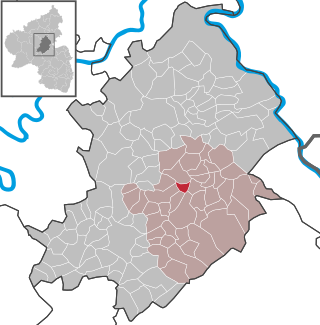
Niederkumbd is an Ortsgemeinde – a municipality belonging to a Verbandsgemeinde, a kind of collective municipality – in the Rhein-Hunsrück-Kreis (district) in Rhineland-Palatinate, Germany. It belongs to the Verbandsgemeinde Simmern-Rheinböllen, whose seat is in Simmern.
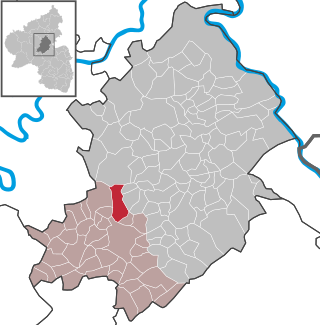
Reckershausen is an Ortsgemeinde – a municipality belonging to a Verbandsgemeinde, a kind of collective municipality – in the Rhein-Hunsrück-Kreis (district) in Rhineland-Palatinate, Germany. It belongs to the Verbandsgemeinde of Kirchberg, whose seat is in the like-named town.

The Village Mill in the Rhineland-Palatinate village of Großkarlbach was once a working mill that was driven by water power. Following its restoration it became a show mill and houses the Großkarlbach Mill Museum; albeit several rooms are used for the Bürgermeister's office and municipal archives, as well as for youth and old people activities and conferences.

The Bakehouse is a historical bakehouse in Dirmstein, Rhineland-Palatinate, Germany, designated as an item of the cultural heritage.

The Evangelische Pfarrkirche in Großwinternheim, part of Ingelheim am Rhein, also called Selztaldom meaning Selz valley cathedral, is a romanesque revival aisleless church built according to Romanesque architecture blueprints from the Middle Rhine. The building is protected by cultural heritage management.

The Wittlich Synagogue was a synagogue built in 1909–1910 in Wittlich, Germany. The restored building still stands and is located on Himmeroder Straße 44.

Manfred Werz is a German civil engineer and the former president of the Federal Association of Road and Traffic Engineers from 1990 to 1993 and Road Administration Rheinland-Pfalz from 1995 to 1998 in Germany. In 1998, he earned the Wirtschaftsmedaille des Landes Rheinland-Pfalz, a prestigious award and acknowledgement for his work, handed by Rainer Brüderle, Minister of Economics and Transport of Rhineland-Palatinate at the time.